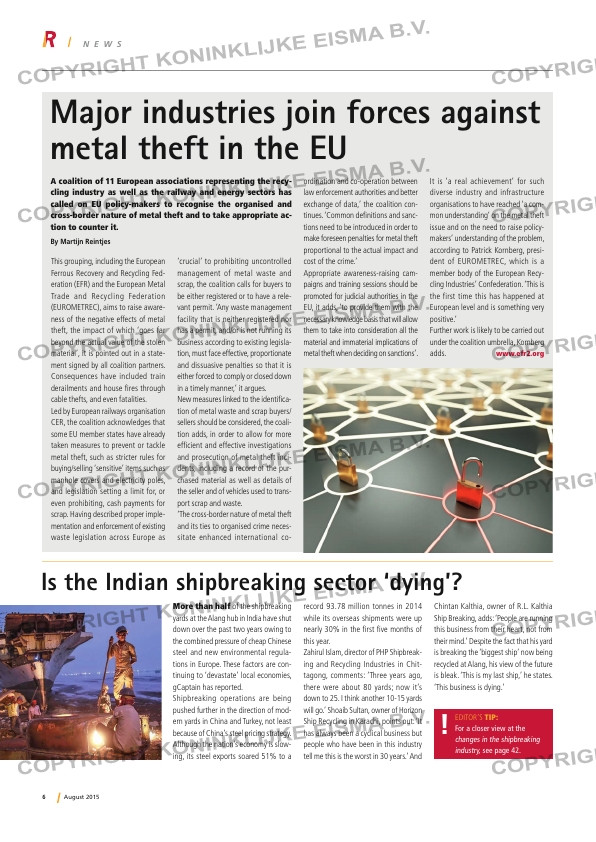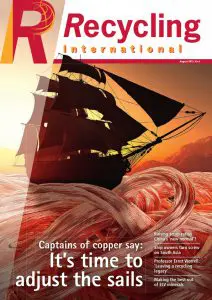Page 6 from: August 2015

6 August 2015
N E W S
This grouping, including the European
Ferrous Recovery and Recycling Fed-
eration (EFR) and the European Metal
Trade and Recycling Federation
(EUROMETREC), aims to raise aware-
ness of the negative effects of metal
theft, the impact of which ‘goes far
beyond the actual value of the stolen
material’, it is pointed out in a state-
ment signed by all coalition partners.
Consequences have included train
derailments and house fires through
cable thefts, and even fatalities.
Led by European railways organisation
CER, the coalition acknowledges that
some EU member states have already
taken measures to prevent or tackle
metal theft, such as stricter rules for
buying/selling ‘sensitive’ items such as
manhole covers and electricity poles,
and legislation setting a limit for, or
even prohibiting, cash payments for
scrap. Having described proper imple-
mentation and enforcement of existing
waste legislation across Europe as
‘crucial’ to prohibiting uncontrolled
management of metal waste and
scrap, the coalition calls for buyers to
be either registered or to have a rele-
vant permit. ‘Any waste management
facility that is neither registered nor
has a permit, and/or is not running its
business according to existing legisla-
tion, must face effective, proportionate
and dissuasive penalties so that it is
either forced to comply or closed down
in a timely manner,’ it argues.
New measures linked to the identifica-
tion of metal waste and scrap buyers/
sellers should be considered, the coali-
tion adds, in order to allow for more
efficient and effective investigations
and prosecution of metal theft inci-
dents, including a record of the pur-
chased material as well as details of
the seller and of vehicles used to trans-
port scrap and waste.
‘The cross-border nature of metal theft
and its ties to organised crime neces-
sitate enhanced international co-
ordination and co-operation between
law enforcement authorities and better
exchange of data,’ the coalition con-
tinues. ‘Common definitions and sanc-
tions need to be introduced in order to
make foreseen penalties for metal theft
proportional to the actual impact and
cost of the crime.’
Appropriate awareness-raising cam-
paigns and training sessions should be
promoted for judicial authorities in the
EU, it adds, ‘to provide them with the
necessary knowledge basis that will allow
them to take into consideration all the
material and immaterial implications of
metal theft when deciding on sanctions’.
It is ‘a real achievement’ for such
diverse industry and infrastructure
organisations to have reached ‘a com-
mon understanding’ on the metal theft
issue and on the need to raise policy-
makers’ understanding of the problem,
according to Patrick Kornberg, presi-
dent of EUROMETREC, which is a
member body of the European Recy-
cling Industries’ Confederation. ‘This is
the first time this has happened at
European level and is something very
positive.’
Further work is likely to be carried out
under the coalition umbrella, Kornberg
adds. www.efr2.org
Major industries join forces against
metal theft in the EU
A coalition of 11 European associations representing the recy-
cling industry as well as the railway and energy sectors has
called on EU policy-makers to recognise the organised and
cross-border nature of metal theft and to take appropriate ac-
tion to counter it.
By Martijn Reintjes
More than half of the shipbreaking
yards at the Alang hub in India have shut
down over the past two years owing to
the combined pressure of cheap Chinese
steel and new environmental regula-
tions in Europe. These factors are con-
tinuing to ‘devastate’ local economies,
gCaptain has reported.
Shipbreaking operations are being
pushed further in the direction of mod-
ern yards in China and Turkey, not least
because of China’s steel pricing strategy.
Although the nation’s economy is slow-
ing, its steel exports soared 51% to a
record 93.78 million tonnes in 2014
while its overseas shipments were up
nearly 30% in the first five months of
this year.
Zahirul Islam, director of PHP Shipbreak-
ing and Recycling Industries in Chit-
tagong, comments: ‘Three years ago,
there were about 80 yards; now it’s
down to 25. I think another 10-15 yards
will go.’ Shoaib Sultan, owner of Horizon
Ship Recycling in Karachi, points out: ‘It
has always been a cyclical business but
people who have been in this industry
tell me this is the worst in 30 years.’ And
Chintan Kalthia, owner of R.L. Kalthia
Ship Breaking, adds: ‘People are running
this business from their heart, not from
their mind.’ Despite the fact that his yard
is breaking the ‘biggest ship’ now being
recycled at Alang, his view of the future
is bleak. ‘This is my last ship,’ he states.
‘This business is dying.’
Is the Indian shipbreaking sector ‘dying’?
EDITOR’S TIP:
For a closer view at the
changes in the shipbreaking
industry, see page 42.
!
RI-6 NEWS.indd 6 05-08-15 13:22



